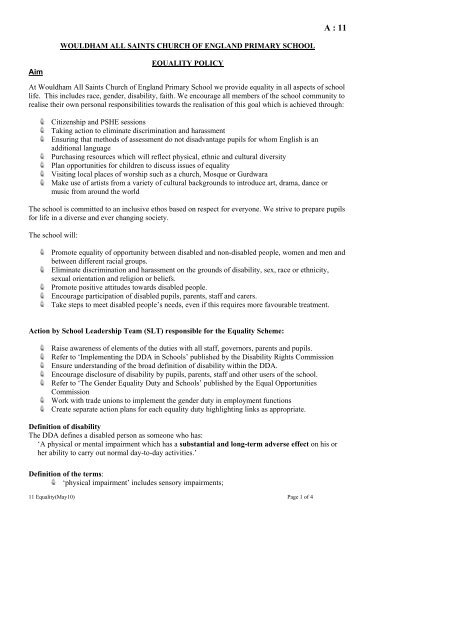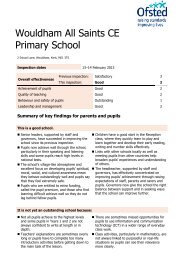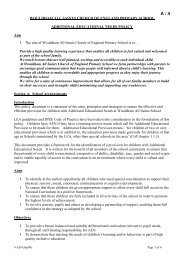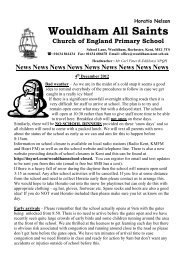Equality Policy - Wouldham All Saints C of E Primary School
Equality Policy - Wouldham All Saints C of E Primary School
Equality Policy - Wouldham All Saints C of E Primary School
You also want an ePaper? Increase the reach of your titles
YUMPU automatically turns print PDFs into web optimized ePapers that Google loves.
A : 11<br />
WOULDHAM ALL SAINTS CHURCH OF ENGLAND PRIMARY SCHOOL<br />
Aim<br />
EQUALITY POLICY<br />
At <strong>Wouldham</strong> <strong>All</strong> <strong>Saints</strong> Church <strong>of</strong> England <strong>Primary</strong> <strong>School</strong> we provide equality in all aspects <strong>of</strong> school<br />
life. This includes race, gender, disability, faith. We encourage all members <strong>of</strong> the school community to<br />
realise their own personal responsibilities towards the realisation <strong>of</strong> this goal which is achieved through:<br />
Citizenship and PSHE sessions<br />
Taking action to eliminate discrimination and harassment<br />
Ensuring that methods <strong>of</strong> assessment do not disadvantage pupils for whom English is an<br />
additional language<br />
Purchasing resources which will reflect physical, ethnic and cultural diversity<br />
Plan opportunities for children to discuss issues <strong>of</strong> equality<br />
Visiting local places <strong>of</strong> worship such as a church, Mosque or Gurdwara<br />
Make use <strong>of</strong> artists from a variety <strong>of</strong> cultural backgrounds to introduce art, drama, dance or<br />
music from around the world<br />
The school is committed to an inclusive ethos based on respect for everyone. We strive to prepare pupils<br />
for life in a diverse and ever changing society.<br />
The school will:<br />
Promote equality <strong>of</strong> opportunity between disabled and non-disabled people, women and men and<br />
between different racial groups.<br />
Eliminate discrimination and harassment on the grounds <strong>of</strong> disability, sex, race or ethnicity,<br />
sexual orientation and religion or beliefs.<br />
Promote positive attitudes towards disabled people.<br />
Encourage participation <strong>of</strong> disabled pupils, parents, staff and carers.<br />
Take steps to meet disabled people’s needs, even if this requires more favourable treatment.<br />
Action by <strong>School</strong> Leadership Team (SLT) responsible for the <strong>Equality</strong> Scheme:<br />
Raise awareness <strong>of</strong> elements <strong>of</strong> the duties with all staff, governors, parents and pupils.<br />
Refer to ‘Implementing the DDA in <strong>School</strong>s’ published by the Disability Rights Commission<br />
Ensure understanding <strong>of</strong> the broad definition <strong>of</strong> disability within the DDA.<br />
Encourage disclosure <strong>of</strong> disability by pupils, parents, staff and other users <strong>of</strong> the school.<br />
Refer to ‘The Gender <strong>Equality</strong> Duty and <strong>School</strong>s’ published by the Equal Opportunities<br />
Commission<br />
Work with trade unions to implement the gender duty in employment functions<br />
Create separate action plans for each equality duty highlighting links as appropriate.<br />
Definition <strong>of</strong> disability<br />
The DDA defines a disabled person as someone who has:<br />
‘A physical or mental impairment which has a substantial and long-term adverse effect on his or<br />
her ability to carry out normal day-to-day activities.’<br />
Definition <strong>of</strong> the terms:<br />
‘physical impairment’ includes sensory impairments;<br />
11 <strong>Equality</strong>(May10) Page 1 <strong>of</strong> 4
‘mental impairment’ includes learning difficulties and an impairment resulting from or<br />
consisting <strong>of</strong> a mental illness;<br />
‘substantial’ means ‘more than minor or trivial’; and<br />
‘long-term’ is defined as 12 months or more.<br />
A : 11<br />
The definition includes a wide range <strong>of</strong> impairments, including hidden impairments such as dyslexia,<br />
autism, speech and language impairments, Attention Deficit Hyperactivity Disorder (ADHD). These are<br />
all likely to amount to a disability, but only if the effect on the person’s ability to carry out normal dayto-day<br />
activities is substantial and long-term, as defined above.<br />
The effect on normal day-to-day activities is on one or more <strong>of</strong> the following:<br />
mobility;<br />
manual dexterity;<br />
physical co-ordination;<br />
continence;<br />
ability to lift, carry or otherwise move everyday objects;<br />
speech, hearing or eyesight;<br />
memory or ability to concentrate, learn or understand;<br />
perception <strong>of</strong> risk <strong>of</strong> physical danger.<br />
Some people are automatically covered by the definition: those with cancer, multiple sclerosis, HIV<br />
infection or a severe disfigurement. There are special provisions for people with progressive or<br />
recurring conditions.<br />
Involvement <strong>of</strong> pupils, staff, parents and other users <strong>of</strong> the school.<br />
The school will consider and plan to involve pupils, staff, parents and other users <strong>of</strong> the school in<br />
relation to the race, disability and gender equality duty.<br />
The school will continue to take into account the preferred means <strong>of</strong> communication for those with<br />
whom they are consulting.<br />
The school will ensure the involvement <strong>of</strong> a range <strong>of</strong> people and hear a range <strong>of</strong> views to meet the<br />
disability, gender and race equality duties.<br />
Information gathering<br />
The collection <strong>of</strong> information is crucial to supporting <strong>Wouldham</strong> <strong>All</strong> <strong>Saints</strong> Church <strong>of</strong> England <strong>Primary</strong><br />
<strong>School</strong> in making decisions about what actions would best improve opportunities and outcomes for<br />
pupils, staff and parents. The information will also subsequently help us to review our performance.<br />
Information will be detailed enough to enable us to measure the delivery on equality duties relating to<br />
disability, race and gender, to assess the impact <strong>of</strong> the changes made and to help the school identify<br />
which <strong>of</strong> our priorities have been achieved.<br />
Information to be gathered<br />
Recruitment, development and retention <strong>of</strong> disabled employees, women and men from different<br />
racial backgrounds.<br />
Education opportunities available to and achievement <strong>of</strong> disabled, female and male pupils and<br />
pupils from different racial backgrounds.<br />
Identify disabled pupils, parents, carers, staff and other users <strong>of</strong> the school to develop the<br />
Scheme(<strong>All</strong> efforts to be made to collect information)<br />
11 <strong>Equality</strong>(May10) Page 2 <strong>of</strong> 4
A : 11<br />
Activity choices <strong>of</strong> both genders<br />
Bullying and harassment on the grounds <strong>of</strong> gender, disability and race.<br />
Impact assessments.<br />
Impact assessments refer to the review <strong>of</strong> all current and proposed policies and practices in order to help<br />
the school act to ensure no gender, racial group or disabled person is disadvantaged by school activities<br />
and to promote race, disability and gender equality. Impact assessments are an on-going process to<br />
ensure that our policies and practices develop, evolve and are incorporated into the school’s planned<br />
review and revision <strong>of</strong> every policy. Every new policy or procedure will be drawn up with regard to our<br />
duties to promote race, disability and gender equality and to eliminate discrimination and harassment<br />
within the school community.<br />
We will use the KCC <strong>Equality</strong> Impact assessment tool for schools as a basis for impact assessments<br />
located at:<br />
Deleted: Disability equality<br />
impact assessment is the process<br />
<strong>of</strong> assessing the impact <strong>of</strong> existing<br />
or proposed practices in relation<br />
to their consequences for<br />
disability equality. The<br />
Deleted: and will<br />
Deleted:<br />
Deleted: alon<br />
http://www.kenttrustweb.org.uk/<strong>Policy</strong>/eq_keydocs.cfm<br />
Making it happen<br />
Implementation<br />
The Scheme will be supported by individual action plans relating to disability, gender and race equality.<br />
The main documents that will inform the development <strong>of</strong> this scheme are:<br />
Implementing the Disability Discrimination Act in schools and early years settings, DFES<br />
Promoting Disability <strong>Equality</strong> in <strong>School</strong>s, DfES Guidance.<br />
The Gender <strong>Equality</strong> Duty and <strong>School</strong>s, EOC guidance<br />
KEY LEGISLATION<br />
<strong>Equality</strong> strand Legislation<br />
Age Employment <strong>Equality</strong> (Age) Regulations 2006<br />
Disability<br />
Disability Discrimination Act 1995, as amended<br />
Special Educational Needs and Disability Act 2001<br />
Disability Discrimination Act 2005<br />
Gender (sex)<br />
Sex Discrimination Act 1975, as amended<br />
<strong>Equality</strong> Act 2006<br />
Gender (reassignment) Sex Discrimination (Gender Reassignment) Regulations 1999<br />
Race<br />
Race Relations Act 1976, as amended<br />
Race Relations (Amendment) Act 2000<br />
Religion or belief Employment <strong>Equality</strong> (Religion or Belief) Regulations 2003, as amended<br />
<strong>Equality</strong> Act 2006<br />
Sexual orientation Employment <strong>Equality</strong> (Sexual Orientation) Regulations 2003, as amended<br />
11 <strong>Equality</strong>(May10) Page 3 <strong>of</strong> 4
A : 11<br />
Managing and Reporting Racial Incidents.<br />
We promote good relations between people <strong>of</strong> different racial groups. However, should such harmony be<br />
breeched, the Headteacher will record and report allegations <strong>of</strong> racial incidents which occur on the<br />
school premises in accordance with LEA procedures. There will be a thorough investigation and the<br />
County’s approved procedure will be followed. The <strong>School</strong> will review action taken to deal with<br />
incidents and will establish a support mechanism for victims and perpetrators alike.<br />
The headteacher will report to Governors at the next meeting following any incident.<br />
<strong>Equality</strong> <strong>Policy</strong><br />
Version 3<br />
May 2010<br />
11 <strong>Equality</strong>(May10) Page 4 <strong>of</strong> 4









